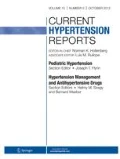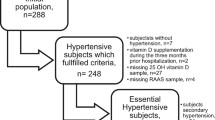Abstract
The prevalence of both hypertension and vitamin D deficiency is high. The discovery of the vitamin D receptor and its possible effects on components of the cardiovascular system influencing blood pressure, such as the renin angiotensin system, the heart, the kidney and the blood vessels, has generated the hope that vitamin D therapy could be a new target for the treatment for hypertensive patients. Cross-sectional studies have clearly shown an association between low levels of vitamin D and hypertension. This association is not as clear in longitudinal studies. Finally, evidence from randomized controlled trials specifically designed to test the hypothesis of a blood pressure lowering effect of vitamin D is weak. Therefore, there is actually not enough evidence to recommend giving vitamin D to reduce blood pressure in hypertensive patients.

Similar content being viewed by others
References
Papers of particular interest, published recently, have been highlighted as: • Of importance
Chobanian AV, Bakris GL, Black HR, et al. Seventh Report of the Joint National Committee on Prevention, Detection, Evaluation, and Treatment of High Blood Pressure. Hypertension. 2003;42(6):1206–52.
Mancia G, De Backer G, Dominiczak A, et al. 2007 ESH-ESC Practice Guidelines for the Management of Arterial Hypertension: ESH-ESC Task Force on the Management of Arterial Hypertension. J Hypertens. 2007;25(9):1751–62.
Krause T, Lovibond K, Caulfield M, et al. Management of hypertension: summary of NICE guidance. BMJ. 2011;343.
Holick MF. Vitamin D deficiency. N Engl J Med. 2007;357(3):266–81.
Zehnder D, Bland R, Williams MC, et al. Extrarenal expression of 25-hydroxyvitamin d(3)-1 alpha-hydroxylase. J Clin Endocrinol Metab. 2001;86(2):888–94.
Pike JW, Meyer MB. The vitamin D receptor: new paradigms for the regulation of gene expression by 1,25-dihydroxyvitamin D(3). Endocrinol Metab Clin N Am. 2010;39(2):255–69.
Bouillon R, Carmeliet G, Verlinden L, et al. Vitamin D and human health: lessons from vitamin D receptor null mice. Endocr Rev. 2008;29(6):726–76.
Kong J, Li YC. Effect of ANG II type I receptor antagonist and ACE inhibitor on vitamin D receptor-null mice. Am J Physiol Regul Integr Comp Physiol. 2003;285(1):R255–61.
Li YC, Kong J, Wei M, et al. 1,25-Dihydroxyvitamin D(3) is a negative endocrine regulator of the renin-angiotensin system. J Clin Invest. 2002;110(2):229–38.
Zhou C, Lu F, Cao K, et al. Calcium-independent and 1,25(OH)2D3-dependent regulation of the renin-angiotensin system in 1alpha-hydroxylase knockout mice. Kidney Int. 2008;74(2):170–9.
Simpson RU, Hershey SH, Nibbelink KA. Characterization of heart size and blood pressure in the vitamin D receptor knockout mouse. J Steroid Biochem Mol Biol. 2007;103(3–5):521–4.
Tiosano D, Schwartz Y, Braver Y, et al. The renin-angiotensin system, blood pressure, and heart structure in patients with hereditary vitamin D–resistance rickets (HVDRR). J Bone Miner Res. 2011;26(9):2252–60.
Dong J, Wong SL, Lau CW et al: Calcitriol protects renovascular function in hypertension by down-regulating angiotensin II type 1 receptors and reducing oxidative stress. European Heart Journal 2012.
Resnick LM, Muller FB, Laragh JH. Calcium-regulating hormones in essential hypertension. Relation to plasma renin activity and sodium metabolism. Ann Intern Med. 1986;105(5):649–54.
• Vaidya A, Sun B, Forman JP et al: The Fok1 vitamin D receptor gene polymorphism is associated with plasma renin activity in Caucasians. Clinical Endocrinology 2011, 74(6):783–790. This genetic assocition study adds new evidence between the interaction of the Fok1 vitamin D receptor gene polymorphism and the renin angiotensin system.
Bukoski RD, DeWan P, McCarron DA. 1,25 (OH)2 vitamin D3 modifies growth and contractile function of vascular smooth muscle of spontaneously hypertensive rats. Am J Hypertens. 1989;2(7):553–6.
Wakasugi M, Noguchi T, Inoue M, et al. Vitamin D3 stimulates the production of prostacyclin by vascular smooth muscle cells. Prostaglandins. 1991;42(2):127–36.
Tarcin O, Yavuz DG, Ozben B, et al. Effect of vitamin D deficiency and replacement on endothelial function in asymptomatic subjects. J Clin Endocrinol Metab. 2009;94(10):4023–30.
Harris RA, Pedersen-White J, Guo DH, et al. Vitamin D3 supplementation for 16 weeks improves flow-mediated dilation in overweight African-American adults. Am J Hypertens. 2011;24(5):557–62.
Dong Y, Stallmann-Jorgensen IS, Pollock NK, et al. A 16-week randomized clinical trial of 2000 international units daily vitamin D3 supplementation in black youth: 25-hydroxyvitamin D, adiposity, and arterial stiffness. J Clin Endocrinol Metab. 2010;95(10):4584–91.
Kristal-Boneh E, Froom P, Harari G, Ribak J. Association of calcitriol and blood pressure in normotensive men. Hypertension. 1997;30(5):1289–94.
Snijder MB, Lips P, Seidell JC, et al. Vitamin D status and parathyroid hormone levels in relation to blood pressure: a population-based study in older men and women. J Intern Med. 2007;261(6):558–65.
Forman JP, Giovannucci E, Holmes MD, et al. Plasma 25-hydroxyvitamin D levels and risk of incident hypertension. Hypertension. 2007;49(5):1063–9.
Jorde R, Figenschau Y, Emaus N, et al. Serum 25-hydroxyvitamin D levels are strongly related to systolic blood pressure but do not predict future hypertension. Hypertension. 2010;55(3):792–8.
Burgaz A, Orsini N, Larsson SC, Wolk A. Blood 25-hydroxyvitamin D concentration and hypertension: a meta-analysis. J Hypertens. 2011;29(4):636–45.
Zhao G, Ford ES, Li C, et al. Independent associations of serum concentrations of 25-hydroxyvitamin D and parathyroid hormone with blood pressure among US adults. J Hypertens. 2010;28(9):1821–8.
Margolis KL, Martin LW, Ray RM, et al. A prospective study of serum 25-hydroxyvitamin D levels, blood pressure, and incident hypertension in postmenopausal women. Am J Epidemiol. 2012;175(1):22–32.
• Zhao G, Ford ES, Li C, Croft JB: Serum 25-hydroxyvitamin D levels and all-cause and cardiovascular disease mortality among US adults with hypertension: the NHANES linked mortality study. J Hypertens 2012, 30(2):284–289. The retrospective epidemiological study base on the NHANES found that in patients with hypertension low levels of 25(OH)D were inversely associated with all-cause and CVD mortality in the US.
Krause R, Buhring M, Hopfenmuller W, et al. Ultraviolet B and blood pressure. Lancet. 1998;352(9129):709–10.
Scragg R, Khaw KT, Murphy S. Effect of winter oral vitamin D3 supplementation on cardiovascular risk factors in elderly adults. Eur J Clin Nutr. 1995;49(9):640–6.
Pfeifer M, Begerow B, Minne HW, et al. Effects of a short-term vitamin D(3) and calcium supplementation on blood pressure and parathyroid hormone levels in elderly women. J Clin Endocrinol Metab. 2001;86(4):1633–7.
de Zeeuw D, Agarwal R, Amdahl M, et al. Selective vitamin D receptor activation with paricalcitol for reduction of albuminuria in patients with type 2 diabetes (VITAL study): a randomised controlled trial. Lancet. 2010;376(9752):1543–51.
• Pittas AG, Chung M, Trikalinos T et al: Systematic review: Vitamin D and cardiometabolic outcomes. Ann Intern Med 2010, 152(5):307–314. This systematic review from the literature studied the relationship between vitamin D status or supplementation on cardiovascular outcomes. It underlines the heterogeneity of observational studies and concludes that the assocation between vitamin D and cardiovascular outcome is uncertain.
Witham MD, Nadir MA, Struthers AD. Effect of vitamin D on blood pressure: a systematic review and meta-analysis. J Hypertens. 2009;27(10):1948–54.
Melamed ML, Michos ED, Post W, Astor B. 25-hydroxyvitamin D levels and the risk of mortality in the general population. Arch Intern Med. 2008;168(15):1629–37.
Disclosure
Drs. Wuerzner and Burnier reported no potential conflicts of interest relevant to this article.
Dr. Waeber has served as a consultant for Novartis and Menarini, and has served as a board member of and received payment for giving lectures to Servier, Novartis, and Astra Zeneca.
Author information
Authors and Affiliations
Corresponding author
Rights and permissions
About this article
Cite this article
Wuerzner, G., Burnier, M. & Waeber, B. Should Hypertensive Patients Take Vitamin D?. Curr Hypertens Rep 14, 318–323 (2012). https://doi.org/10.1007/s11906-012-0271-x
Published:
Issue Date:
DOI: https://doi.org/10.1007/s11906-012-0271-x




